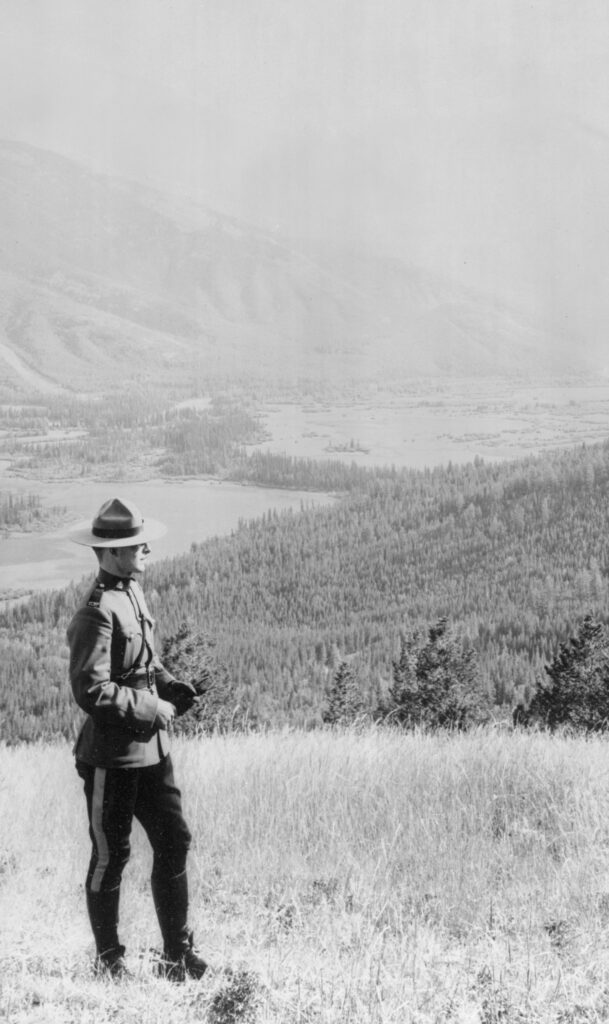Medway, Alberta, is a small fictional town and the setting of Marina Endicott’s The Observer. Julia Carey is the narrator; her partner, Hardy Willis, has accepted a position in the local Royal Canadian Mounted Police division. “Medway meant nothing to either of us,” Julia explains, “but we looked it up on my big Rand McNally as we zoomed along, and I stuck my finger on the spot, a tiny town on the Alaska Highway northeast of Edmonton.”
Although comparisons will inevitably be made between this novel and Sinclair Ross’s 1941 classic, As for Me and My House, with its ambiguous female narrator, Julia is a devoted partner, trying to fathom the duties of her Mountie: “There were a lot of rules that I did not yet know or understand. In the two months we’d been here, over and over I had leaped to a conclusion only to discover that I’d been wrong or misinformed, or prejudiced by my earlier urban life. Now I was trying not to leap.”
After Julia, who dreams of being a writer, abandons a prospective job at a good regional theatre to accompany Hardy, she immediately obtains a position with the town’s understaffed weekly newspaper, the Observer, first as a part-time employee and later on a permanent contract. As a journalist, she is responsible for gathering the local news, studying the place and its citizens and describing their glories and their problems.
Julia’s patient observing opens her life up to myriad vistas and intrigues. She meets the other new recruit on the force, Vinn Kelly, and his girlfriend, Kelly Kruger, the vice-principal of the high school: “He joked that they could never get married because then she’d be Kelly Kelly.” The aging widow Marion Northey invites Julia and Hardy to her “beautiful house inside and out, clean wood and simple lines, every part of it sustainable, solar-powered and eco-conscious. Her engineer husband had designed it to run off the grid forever.” (Marion’s friendship helps to ground Julia, who is much younger.) Another widow is in her mid-thirties: Stephanie Elwood, whose husband had been an officer until he was wounded and eventually died by suicide. “Old trouble showed in her face, sad lines that I supposed might never be erased,” Julia observed. Each of these miniature references, embedded so skillfully in her account, might well be separate short stories.

The Mountie’s work begins to take a toll.
Bettmann; Getty Images
Julia also describes the local constabulary, including Sergeant Trinke, the head of the division, who is sent to Red Deer with a promotion to staff sergeant. His replacement, Ted Cameron, is of “a new generation.” Julia tells us that he is “fiftyish, very fit, with crinkling eyes and an easy, energetic public persona.” He will become a great comfort to her in a time of need.
Throughout, Julia encounters the less than positive aspects of her new life. Mabel Miller, a ninety-three-year-old would‑be writer, seeks the newcomer’s assistance to give shape to her memories, but Julia finds her exceptionally dislikable. There are the many traffic accidents that monopolize the time of the officers on duty. And Johnny Mair is an omnipresent ne’er‑do‑well whose increasing malevolence brings terror to the people of Medway.
At the centre of Julia’s life, though, is Hardy, with his ambition and superb sense of duty. “I kept seeing things that made me revise my former opinions about police, opinions formed by my repugnance for the idea of police authority in general, and by my fear and ignorance,” Julia tells us. “Watching Hardy do the job, I learned from his open-minded understanding and empathy — empathy he was very good at allowing other people, while never for an instant allowing it for himself, or by extension me.”
But slowly, gradually, Hardy’s work begins to take a toll. His irascible temper gets the better of him in non-explosive situations; his interaction with his friends drifts frequently into his silence. His attention to detail crosses into feverish hyper-alertness. “Hardy’s stability had crumbled,” Julia concedes. “He could not be present in the moment, so he drifted off into the distance.” His slow path to recovery requires patience on his part and on Julia’s, and the latter half of the novel chronicles this relentlessly traumatic experience. Hardy has an understanding sergeant, helping to reduce, relieve, and ultimately even remove the corrosive effects of his plight.
In the end, Julia and Hardy take a transfer to Calgary. “I hurry to write but memory sticks and stalls, and the years have been surprisingly long,” admits the sad narrator. But the comfortable world she has described is as alive and vital as the many memories she shares with us. She has given us an intimate account of Medway, its people, and their triumphs and tragedies. She is the patient observer, as knowing and perceptive as the newspaper that employs her. Unlike the Bentleys of As for Me and My House, who depart their town with some ambivalence, Julia and Harvey are delighted with their choice of a new home in the city.
As a study of a small town and its inhabitants told through the knowing eyes of an outsider, The Observer explores a young couple’s early years in a rich setting. The novel would be even stronger, however, without an extraneous fourteen-paragraph final section, “Last Post,” in which Julia reports that four RCMP officers were killed by Johnny Mair a few years after her departure from Medway.
“This book is fiction,” Endicott maintains in her acknowledgements. “I stitched together after-images and fragments of memory, and made up the rest.” She then names four slain Mounties from her previous life in Mayerthorpe, Alberta. So, arguably, she does more than simply stitch together partial memories.
Around the time of the novel’s publication, Endicott wrote in the Globe and Mail, “It is the job of art: to investigate your own experience unsparingly, and make that investigation public so that others can use the evidence in their own private investigations.” In reality, of course, this is not the sole purpose of art. She also explained, with reference to her manuscript, “It was mawkish and self-involved and I drawered it. Over the years I tried various other forms, none satisfactory.” Perhaps still more time was needed; perhaps more distance was necessary.
Ultimately, the conspicuous blurring of fiction and fact at the end reduces the impact of The Observer, which could otherwise stand as a distinct and separate imaginative work.
David Staines is the author of A History of Canadian Fiction and other books. He teaches English literature at the University of Ottawa.

